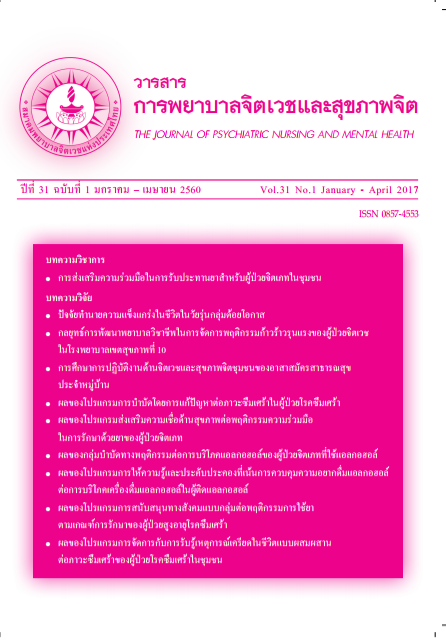ปัจจัยทำนายความแข็งแกร่งในชีวิตในวัยรุ่นกลุ่มด้อยโอกาส FACTORS PREDICTING RESILIENCE IN UNDERPRIVILEGED ADOLESCENTS
Main Article Content
บทคัดย่อ
Abstract
Objective: The purpose of this study was to investigate factors predicting resilience in underprivileged adolescents.
Methods: A simple random sampling technique was used to select 224 secondary school students from a school for underprivileged adolescents in Thailand. Data were collected by a set of self-report questionnaires including a demographic questionnaire, the Thai Stress Test, the Resilience Inventory, and the Negative Events Scale. Descriptive statistics, correlation coefficient, and stepwise multiple regression were employed for data analyses.
Results: The results revealed that age, economic status, stress, and negative events
(problems with friends, problems with boy/ girlfriend, problems with teachers, problems with parents, problems with other students, problems with relatives, financial problems, problems with academic courses, health problems and problems with academic limitations and course interest) had significant relationship with resilience. The negative events and age could collectively explain variance of resilience at 17.30 percentages.
Conclusion: The findings of this study can be used as basic information to develop a nursing intervention to prevent psychological problems and also enhance resilience of the underprivileged adolescents.
บทคัดย่อ
วัตถุประสงค์: การศึกษาครั้งนี้มีวัตถุประสงค์เพื่อศึกษาปัจจัยทำนายความแข็งแกร่งในชีวิตในวัยรุ่นกลุ่มด้อยโอกาส
วิธีการศึกษา: กลุ่มตัวอย่าง คือ นักเรียนที่กำลังศึกษาในระดับมัธยมศึกษาปีที่ 1 ถึง 6 โรงเรียนศึกษาสงเคราะห์แห่งหนึ่งในประเทศไทย จำนวน 224 คน เลือกตัวอย่างโดยใช้วิธีสุ่มอย่างง่าย เครื่องมือที่ใช้ในการเก็บรวบรวมข้อมูลประกอบด้วย แบบสอบถามข้อมูลส่วนบุคคล แบบวัดความเครียด แบบประเมินความแข็งแกร่งในชีวิตและแบบวัดเหตุการณ์ที่สร้างความยุ่งยากใจวิเคราะห์ข้อมูลโดยใช้สถิติบรรยาย สัมประสิทธิ์สหสัมพันธ์ และการวิเคราะห์การถดถอยพหุคูณแบบเป็นขั้นตอน
ผลการศึกษา: ผลการศึกษาพบว่า อายุ สถานะทางการเงิน ความเครียด และเหตุการณ์ ที่สร้างความยุ่งยากใจ (ปัญหากับเพื่อน ปัญหากับแฟน ปัญหากับครู/ อาจารย์ ปัญหากับบิดา/ มารดา ปัญหากับนักศึกษาอื่น ปัญหากับญาติ/พี่น้องปัญหาการเงิน ปัญหาเกี่ยวกับกระบวนการเรียน ปัญหาด้านสุขภาพ และปัญหาด้านข้อจำกัดในการเรียนและความสนใจในวิชาเรียน) มีความสัมพันธ์กับความแข็งแกร่งในชีวิตอย่างมีนัยสำคัญทางสถิติเหตุการณ์ที่สร้างความยุ่งยากใจ และอายุสามารถร่วมกันทำนายความแข็งแกร่งในชีวิตได้ร้อยละ 17.30 อย่างมีนัยสำคัญทางสถิติ
สรุป: ผลที่ได้จากการศึกษาครั้งนี้สามารถนำไปใช้เป็นข้อมูลพื้นฐานในการพัฒนาการปฏิบัติการพยาบาลในการเสริมสร้างความแข็งแกร่งในชีวิตให้แก่วัยรุ่น เพื่อป้องกันการเกิดปัญหาสุขภาพจิตในวัยรุ่นด้อยโอกาสต่อไป
Article Details
บทความที่ได้รับการตีพิมพ์แล้ว เป็นลิขสิทธิ์ของสมาคมพยาบาลจิตเวชแห่งประเทศไทย


